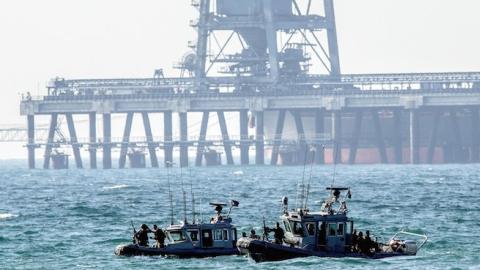As the world digests the full dimensions of John Kerry’s latest diplomatic disaster in Gaza, the fighting there continues to grind on, with Israel relying on Iron Dome to protect its citizens, and Hamas using its citizens as human shields to protect itself.
But all knowledgeable observers know this has been Hamas’ modus operandi all along. Since it came to power in Gaza in 2007, the radical terror organization has been waging a two-front war, one against “the Zionist entity” or Israel and the other against the lives, prosperity, and future of the residents of Gaza.
It’s done this not just by using children as human shields, but by systematically blocking development of the one natural resource the Gaza Strip has, the Gaza Marine offshore natural gas reserves.
In fact, Hamas’ leaders know the surest way to undermine their war with Israel would be to allow Palestinians to turn their natural gas holdings into a ticket out of poverty — and out of dependence on Hamas and its foreign paymasters.
Those offshore deposits — some 1 trillion cubic feet worth — were discovered by BP, the original leaseholder for oil and gas exploration in the region, back in 2000. BP eventually sold its leases for the offshore fields further east to the Israeli government for one dollar — undoubtedly the best investment Israel ever made, since the Mari-B, Tamar, and Leviathan fields have turned out to be the biggest natural gas find of the past two decades.
BP kept the Gaza Marine lease, however, and began to work out a plan with Israel to let the Palestinian Authority develop those fields for its own economic use. Far from coveting the Gaza field, Israel even carved out a special niche from its own maritime Exclusive Economic Zone so that the rights to the field would be exclusively Palestinian.
All hopes for opening the field, including possibly shipping gas to the West Bank, were dashed when Hamas took power in Gaza in 2007. Hamas immediately tore up the deal, claiming it was a corrupt product of its power rival Fatah, while Israel backed off from any arrangement that would put natural gas royalties into the pockets, as well as the rockets, of Hamas terrorists.
Israel’s reluctance to see offshore gas wells used to fund terrorism is understandable. That’s why it won’t cooperate with any effort to set up exploratory wells or to build a pipeline to bring any Gaza gas to market. That in turn leads Hamas apologists to accuse Israel of “waging a war of conquest” against Gaza in order to grab the gas for itself, and to deny Palestinians their economic birthright.
This is paranoid nonsense. One trillion cubic feet of natural gas sounds impressive, but that’s not much more than the smallest of Israel’s recent offshore finds, Mari B — and more than dwarfed by Tamar and Leviathan, which total of 30 trillion cubic feet. Israel, in short, will have all the gas it needs for several decades — and the fighting in Gaza, far from helping with a gas grab, is actually hurting Israel’s chances of finding more foreign oil and gas investors.
Instead, the real culprits are Hamas and its most important financial and weapons suppliers, Iran and Qatar. Iran holds the second biggest natural gas reserves in the world, and doesn’t want the development of any natural gas finds in the Mediterranean, Israeli or otherwise. Neither does Qatar, which happens to have the third biggest reserves. Nor does Russia, which has the biggest of all—but which has also been dangling the possibility of a deal to open the Gaza Marine field in front of Palestinian president Mahmoud Abbas since January.
Don’t expect Hamas to let that happen if it helps arch-rival Abbas — and Russia's Gazprom isn’t going to spend time and money opening up a natural gas reserve that experts agree is too tiny for export or conversion to liquid natural gas.
In fact, leasing the rights to Gazprom will probably mean the Palestinians’ natural gas resources will stay buried under the sea bed for a long time to come.
Maybe one day Palestinians will wake up to the fact that their mortal enemies aren’t the Jews and Israelis, but their own leaders. They’ve made their lives nasty, brutish, and short for almost seven decades, since 1948. They also had a vested interest in keeping them in permanent poverty.
Keeping Gaza Marine off limits to development is one of the best ways of doing that.

















